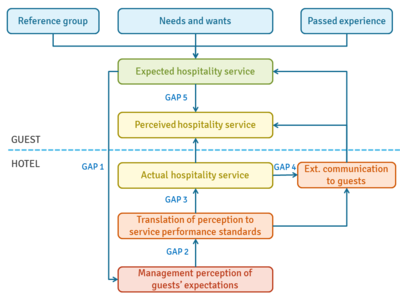Hospitality product quality: Difference between revisions
mNo edit summary |
mNo edit summary |
||
| Line 20: | Line 20: | ||
# Other (e.g., attractive location, staff, wider range of services). | # Other (e.g., attractive location, staff, wider range of services). | ||
[[File:hospitality_product_quality.png|400px|right|thumb|Fig.1. Hopitality product quality in SERVQUAL model]] | [[File:hospitality_product_quality.png|400px|right|thumb|Fig.1. Hopitality product quality in [[SERVQUAL]] model]] | ||
Assessment of the level of hospitality [[product quality]] is a very important part of the process of its improvement. Without it we would not be possible to determine the directions of improving and raising the level of service quality. The [[quality]] level can be defined as the described values of individual features and characteristics which make up the service. Each state corresponds to a certain level of fulfilling the [[needs]] of consumers, and thus also their level of satisfaction. The higher level of consumer satisfaction, the higher [[level of quality]] and improved rating. The measurement of quality is therefore an estimate of the degree to which hospitality service meets expectations and [[needs]] of [[Hotel categorization|hotel guests]]. | Assessment of the level of hospitality [[product quality]] is a very important part of the process of its improvement. Without it we would not be possible to determine the directions of improving and raising the level of service quality. The [[quality]] level can be defined as the described values of individual features and characteristics which make up the service. Each state corresponds to a certain level of fulfilling the [[needs]] of consumers, and thus also their level of satisfaction. The higher level of consumer satisfaction, the higher [[level of quality]] and improved rating. The measurement of quality is therefore an estimate of the degree to which hospitality service meets expectations and [[needs]] of [[Hotel categorization|hotel guests]]. | ||
Revision as of 12:38, 31 August 2020
| Hospitality product quality |
|---|
| See also |
Hospitality product quality is very important for the modern tourist, who attaches great importance and focus on quality of life, and increasingly chooses products and services best suited to his expectations, that is, one that has the appropriate quality. It becomes the main instrument of competition in the market. It is also confirmed by the Institute of Internal Market and Consumer Sciences. According to it, among the tools used by the competitive struggle firms, is crucial in order:
- Quality - 72% of responses,
- Price - 61%,
- Level of service - 55%,
- Other (e.g., attractive location, staff, wider range of services).

Assessment of the level of hospitality product quality is a very important part of the process of its improvement. Without it we would not be possible to determine the directions of improving and raising the level of service quality. The quality level can be defined as the described values of individual features and characteristics which make up the service. Each state corresponds to a certain level of fulfilling the needs of consumers, and thus also their level of satisfaction. The higher level of consumer satisfaction, the higher level of quality and improved rating. The measurement of quality is therefore an estimate of the degree to which hospitality service meets expectations and needs of hotel guests.
It should be noted that no one except the consumer can not precisely determine whether their needs were met. Therefore, quality assessment can not take place without the participation of client. Less important is what the provider thinks about his service, it is important how the client sees it. Without knowing the opinion of the consumers all activities focused on quality will be burdened with a large risk of failure. An extremely important feature influencing the service quality research is the dominance of intangible elements, impermanence and the inseparability of acts of creation and consumption, which implies the presence of the customer for the service. All this makes the assessment of service quality must be made during the service by those who participate in the process and / or know it thoroughly. Of course, these are customers.
There are several sources of knowledge to gather the consumer opinions. These are:
- Book of wishes and concerns of the customers,
- Analysis of claims,
- Quality control by an anonymous researcher called the "mystery client",
- guests surveys,
- Employees and managers of hospitality firms having extensive knowledge in respect of the experience, skills, customer follow-up, conduct direct interviews with customers.
See also:
References
- Narangajavana, Y. (2007). The Relationship of the Hotel Rating System and Service Quality (Doctoral dissertation, Oklahoma State University).
- Oh, H. (1999). Service quality, customer satisfaction, and customer value: A holistic perspective. International Journal of Hospitality Management, 18(1), 67-82.
- Wong Ooi Mei, A., Dean, A. M., & White, C. J. (1999). Analysing service quality in the hospitality industry. Managing Service Quality: An International Journal, 9(2), 136-143.
- Morrison, A. M. (1996). Hospitality and travel marketing (No. Ed. 2). Delmar Publishers.